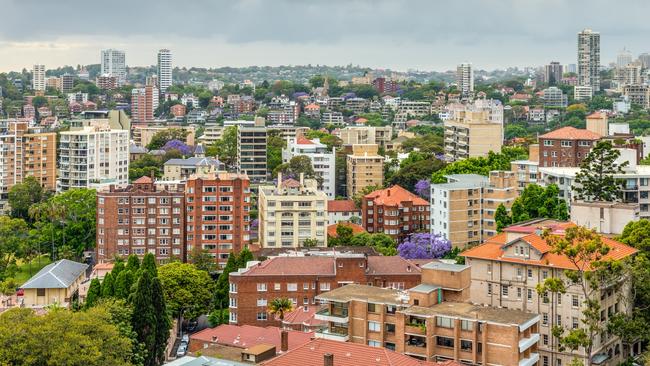A tale of two lenders: how Gemi and Pallas are shaping the private credit industry and Sydney’s east
Sydney’s eastern suburbs are home to two very different tales of the private credit boom, which is largely a $188bn mystery to market regulator ASIC.

Business
Don't miss out on the headlines from Business. Followed categories will be added to My News.
Once upon a time it was banks. Now, Sydney’s eastern suburbs are being built on private credit.
As the market regulator refines the scope of its examination of private markets, it is increasingly fixated on the private credit component, which describes any kind of lending done outside of the banking sector.
For property developers, it represents an increasingly influential pool of capital, so much so that industry lobbyist the Property Council this week warned the Australian Securities & Investments Commission in its submission that “reforms which seek to improve the attractiveness of the public market should not come at the expense of the private market”.
EY analysis cited by the Reserve Bank estimates private credit in Australia at $188bn, including assumptions about the size of loans not reported to the prudential regulator.

Holding Redlich partner Andrew Stone told The Australian the private credit market was rapidly growing, but urged caution on calls for regulators to be handed new powers to intervene, noting ASIC was already armed to intervene on behalf of investors.
But Mr Stone said the rise of Australia’s legion of “sophisticated investors”, who boast more than $2.5m in assets, boosted the need for ASIC’s focus.
“There are levers you can pull without throwing out the current regulatory regime,” Mr Stone said. “There’s some fine tuning that could happen.”
Australia’s retirement giants have also poured money in.
Two players with outsized clout are the privately owned Pallas Group and Gemi Investments.
They are on the industry’s radar for different reasons: Pallas an apparent success, with projects across the country, and Gemi locked in a tortuous run-off after crashing out on several property gambits.
Private credit is a source of intrigue for the regulator because its explosive lending has been met with concerns about the protections and traps presented to investors, institutional and retail alike.
A survey sent by ASIC to market participants is specifically probing “governance, valuation practices, conflicts of interest, insider trading, the protection of confidential information, and the fair treatment of investors”, The Australian reported.
It is looking at disclosures and side letter arrangements, as well as how assets, fees, and expenses flow between these entities and their parent companies.
Pallas Group success
Double Bay lender Pallas Group boasts a $2.1bn loan book.
With money backing Pallas from sophisticated investors and big names, including Morgans’ Rob Fiani and retail billionaire Gerry Harvey, the group has also convinced financiers Westpac, Ares and Goldman Sachs to bankroll its lending book.
But Pallas, which itself has faced an ASIC investigation, is carving out a novel presence because it also lends to its own property development arm, Fortis.
Private credit rivals Qualitas, Metrics Credit Partners, Alceon and Apollo-backed MaxCap do not develop and lend to themselves like Pallas-Fortis.
Indeed, firms which tried a similar model, such as the Melbourne-based Steller run by Simon Pitard and Nicholas Smedley, collapsed owing millions. And Kingdom Developments, run by Andrew Bodnar, raised investor funds for property developments but then collapsed and ASIC banned Bodnar.
Pallas Capital (as the financing arm of Pallas Group is known) executive director Dan Gallen said Pallas was not unique, noting a number of other non-bank lenders also undertook developments funded by debt or equity.

“Unlike some lenders, where we have offered equity investments (where the rate of return depends on the success of the project) we only do this on a single project basis, not through an investment pool,” Mr Gallen said.
“This means that investors have full disclosure relating to the specific property. A large number of our investors prefer to invest in these single asset structures.”
This could mean a single project, like a proposed 20-apartment development in Elizabeth Bay.
Pallas has previously insisted Fortis does not borrow money, and simply acts as a development manager to the special purpose vehicle set up for each project.
This may be true, but these Pallas-financed projects are overseen by Fortis and yield millions in fee income. It’s no wonder ASIC’s curiosity is piqued by how fee arrangements are proliferating through the industry.
Mr Gallen said Pallas disclosed all its fees in memoranda given to investors.
“What some might view as a ‘conflict’ is, for many of our investors, a strong positive — representing alignment of interests and confidence in execution,” he said.
“Our approach to managing conflicts arising from debt and equity investments is the same as other lenders.
“This includes strict legal documentation prepared by external law firms and full disclosure of conflicts in the relevant Information Memorandum.”
Fortunately, Pallas has never enforced on a loan tied to a Fortis project.
“Given that we have never defaulted on any commitment to any investor, across almost 1000 investments to-date, we believe that our guardrails and procedures have performed well,” Mr Gallen said.
Pallas rapidly grew its project book over the Covid-19 years, meaning several projects are now approaching completion.
The developer is also scoping out plans for 3 Fullerton Street Woollahra.
Who is Gemi?
Gemi Investments, run by eastern suburbs denizens Justin Epstein, Michael Cooper and George Fleming, is staring down a potential class action and an unwinding of an $800m loan book.
Investor ire was stoked after the lender froze redemptions and distributions. The lender has found itself wrapped up in the financial saga of Sydney pub baron Jon Adgemis, having written huge loans to fund his purchase of a string of off-broadway pubs across Sydney and Melbourne.

Some proved a hit, while others have struggled amid troubled renovations or a squeeze in trade as punters stayed home to ride out the cost of living pinch.
But Gemi’s monthly performance updates paint a more flattering picture. In January 2024, Gemi spruiked its 10.5 per cent return across the 79 loans in its Gemi Fund, noting at the time its zero losses since inception.
By June, Gemi’s disclosures dropped any reference to loss rate since inception. And by July, Gemi published no returns figure, after distributions were frozen in June.
Investors contacted by The Australian described the lack of information from Gemi as the fund froze up, with little clarity about the cause of its problems and loans in default.
Loans to Adgemis’ pub business accounted for nearly a fifth of Gemi’s total loans, but the group’s exposure was magnified as Gemi had also done deals with the businessman through special purpose vehicles.
Adgemis also has the backing of Archibald Capital.
An apparent mix of debt and equity has troubled some investors, who cautioned it made prosecuting the case for either class of investor complicated.
Attempts to contact Gemi failed after several attempts to reach its principals, with former Athlete’s Foot boss Michael Cooper, now a Gemi director, telling The Australian “no one is going to be responding” when it visited the firm’s Martin Place headquarters.
In mid-April, Gemi told investors it would move to quarterly performance reporting instead of monthly.
The group revealed that 58 per cent of its loan book was now in “workout” mode, with a further 17 per cent tied up in legal action.
An apparent focal point is a 17,000 square metre site in Castle Hill, which Gemi has failed to sell through Colliers after seizing the property from its borrower. Gemi is now attempting to develop the massive site, and would look to a sale process upon securing development approval.
It is also trying to sell Channel 7’s office and studio in Hindmarsh, Adelaide, but a campaign to sell the block last year failed to “generate the expected level of interest”.
More Coverage
Originally published as A tale of two lenders: how Gemi and Pallas are shaping the private credit industry and Sydney’s east





